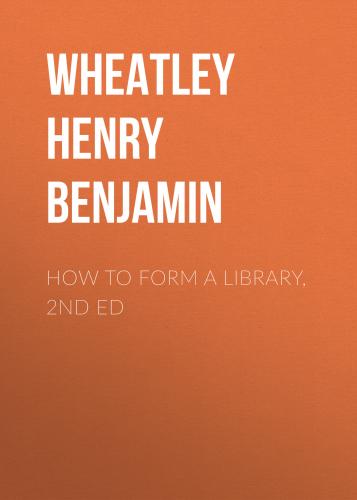Many special points arise for consideration when we deal with the question—How to buy at sales? and Mr. Edward Edwards gives the following four rules for the guidance of the young book-buyer (Memoirs of Libraries, vol. ii. p. 645):
1. The examination of books before the sale, not during it. 2. A steady unintermittent bidding up to his predetermined limit, for all the books which he wants, from the first lot to the last; and—if there be any signs of a "combination"—for a few others which he may not want. 3. Careful avoidance of all interruptions and conversation; with especial watchfulness of the hammer immediately after the disposal of those especially seductive lots, which may have excited a keen and spirited competition. (There is usually on such occasions a sort of "lull," very favourable to the acquisition of good bargains.) 4. The uniform preservation and storing up of priced catalogues of all important sales for future reference.
A case of conscience arises as to whether it is fit and proper for two buyers to agree not to oppose each other at a public sale. Mr. Edwards says, "At the sales Lord Spencer was a liberal opponent as well as a liberal bidder. When Mason's books were sold, for example, in 1798, Lord Spencer agreed with the Duke of Roxburghe that they would not oppose each other, in bidding for some books of excessive rarity, but when both were very earnest in their longings, "toss up, after the book was bought, to see who should win it." Thus it was that the Duke obtained his unique, but imperfect, copy of Caxton's Historye of Kynge Blanchardyn and Prince Eglantyne, which, however, came safely to Althorp fourteen years later, at a cost of two hundred and fifteen pounds; the Duke having given but twenty guineas."13
It is easy to understand the inducement which made these two giants agree not to oppose each other, but the agreement was dangerously like a "knock-out." Mr. Henry Stevens (in his Recollections of Mr. James Lenox) boldly deals with this question, and condemns any such agreement. He writes, "Shortly after, in 1850, there occurred for sale at the same auction rooms a copy of 'Aratus, Phaenomena,' Paris, 1559, in 4o, with a few manuscript notes, and this autograph signature on the title, 'Jo. Milton, Pre. 2s. 6d. 1631.' This I thought would be a desirable acquisition for Mr. Lenox, and accordingly I ventured to bid for it as far as £40, against my late opponent for the Drake Map, but he secured it at £40 10s., remarking that 'Mr. Panizzi will not thank you for, thus running the British Museum.' 'That remark,' I replied, 'is apparently one of your gratuities. Mr. Panizzi is, I think, too much a man of the world to grumble at a fair fight. He has won this time, though at considerable cost, and I am sure Mr. Lenox will be the first to congratulate him on securing such a prize for the British Museum.' 'I did not know you were bidding for Mr. Lenox.' 'It was not necessary that you should.' 'Perhaps at another time,' said he, 'we may arrange the matter beforehand, so as not to oppose each other.' 'Very well,' I replied, 'if you will bring me a note from Mr. Panizzi something to this effect: 'Mr. Stevens, please have a knock-out with the bearer, the agent of the British Museum, on lot **, and greatly oblige Mr. John Bull and your obdt. servant, A.P.,' I will consider the proposition, and if Mr. Lenox, or any other of my interested correspondents, is not unwilling to combine or conspire to rob or cheat the proprietors, the 'thing' may possibly be done. Meanwhile, until this arrangement is concluded, let us hold our tongues and pursue an honest course.' That man never again suggested to me to join him in a 'knock-out.'"
Конец ознакомительного фрагмента.
Текст предоставлен ООО «ЛитРес».
Прочитайте эту книгу целиком, купив полную легальную версию на ЛитРес.
Безопасно оплатить книгу можно банковской картой Visa, MasterCard, Maestro, со счета мобильного телефона, с платежного терминала, в салоне МТС или Связной, через PayPal, WebMoney, Яндекс.Деньги, QIWI Кошелек, бонусными картами или другим удобным Вам способом.
